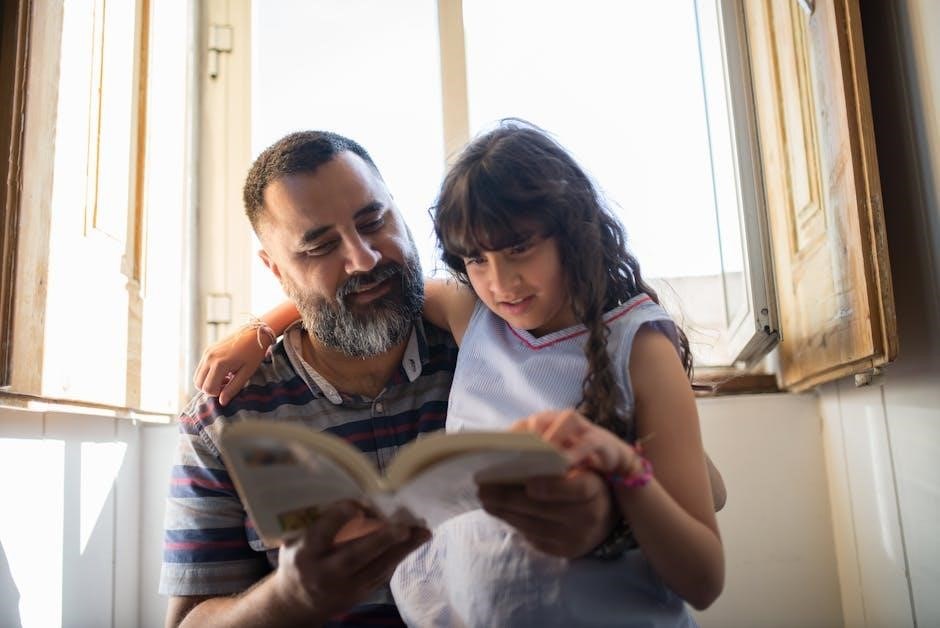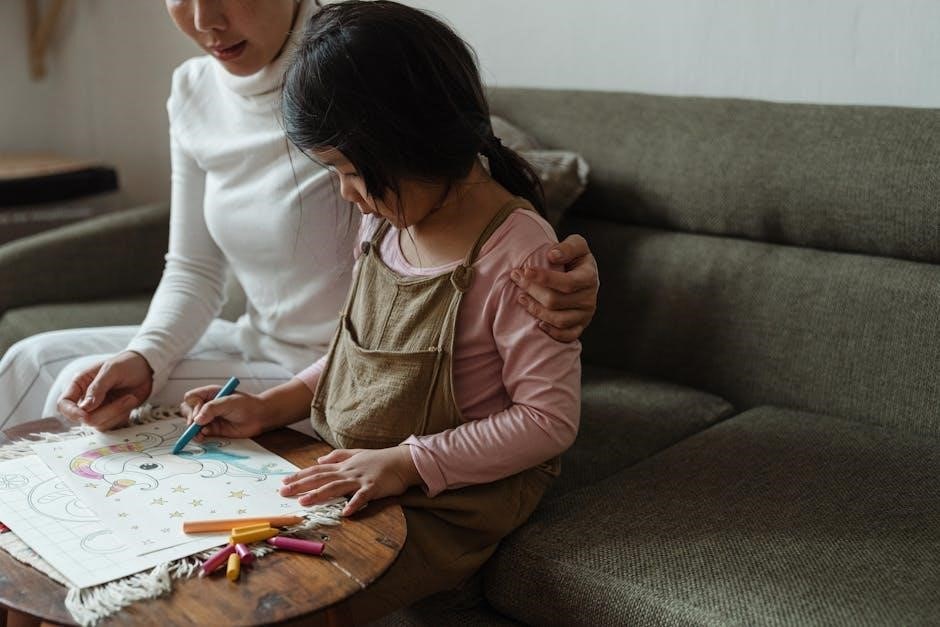martyrs parents guide
Summary
Discover the ultimate Martyrs Parents Guide! Learn how to discuss historical heroes and their sacrifices with your children in a meaningful way.

The Martyrs Parents Guide provides insights into the film’s themes‚ violence‚ and emotional impact‚ helping parents make informed decisions about their children’s viewing experiences.
Understanding the Purpose of the Guide
The Martyrs Parents Guide is designed to empower parents with essential information about the film’s content‚ themes‚ and potential emotional impact on children. By providing a detailed overview‚ the guide helps parents make informed decisions about whether the movie is suitable for their child. It balances the need to protect children from inappropriate content with the desire to allow them to explore complex themes. The guide also offers expert tips and resources to support children in processing difficult emotions and fostering resilience. Ultimately‚ its purpose is to enable mindful parenting‚ ensuring children are both protected and guided in their media consumption.
Overview of the Movie and Its Themes
Martyrs is a French extreme horror film that explores intense themes of trauma‚ revenge‚ and the boundaries of human endurance. The story follows two women seeking retribution against their former captors‚ delving into dark and unsettling scenarios. The film is known for its graphic content‚ which serves to underscore its exploration of pain‚ suffering‚ and the concept of transcendence. Themes of violence‚ morality‚ and the psychological effects of trauma are central to the narrative. While the movie is controversial due to its extreme nature‚ it provokest thought about the consequences of unchecked vengeance and the blurred lines between victim and perpetrator.

Violence and Gore in Martyrs
Martyrs contains extreme violence‚ including prolonged scenes of torture and graphic gore. The film’s intense depictions are designed to provoke emotional responses and explore dark themes.
Types of Violent Acts Depicted
The film Martyrs includes graphic and disturbing violence‚ such as prolonged torture‚ brutal beatings‚ and mutilation. These acts are often depicted in extreme detail‚ leaving little to the imagination. The violence is not only physical but also psychological‚ as characters endure relentless suffering. Scenes of gore are frequent‚ with explicit visuals of blood‚ wounds‚ and bodily harm. The intensity of these depictions is unparalleled in mainstream cinema‚ making it deeply unsettling for viewers. Parents should be aware that the film’s violent content is not brief or suggestive; it is explicit‚ prolonged‚ and deeply disturbing. This makes it unsuitable for young or sensitive audiences.
Comparison to Mainstream Standards
Martyrs surpasses typical mainstream cinematic violence in both intensity and duration. While many films depict violent acts‚ they often do so with restraint‚ using camera angles or editing to reduce graphic detail. In contrast‚ Martyrs presents prolonged and unflinching sequences of brutality‚ often exceeding what is considered acceptable in conventional R-rated films. The film’s graphic content rivals or surpasses that of extreme horror genres‚ making it far more explicit than mainstream fare. This extreme portrayal sets it apart from standard Hollywood releases‚ emphasizing the need for parental awareness and discretion. The film’s unrelenting nature makes it significantly more disturbing than typical violent movies.
Impact of Graphic Content on Young Viewers
Exposure to the extreme violence and gore in Martyrs can have profound effects on young viewers. The prolonged and graphic depiction of suffering may lead to emotional trauma‚ desensitization to violence‚ and increased anxiety. Children and teenagers‚ still developing emotional regulation‚ may experience heightened fear responses and difficulty processing such intense imagery. This can alter their perception of violence and its consequences‚ potentially affecting their empathy and worldview. Parents must consider the maturity and sensitivity of their child before allowing them to watch this film‚ as its content may leave lasting psychological impressions and raise ethical questions about the glorification of pain and suffering.

Themes and Content of the Movie
Martyrs explores intense themes of trauma‚ revenge‚ and transcendence through extreme violence‚ raising moral questions about pain and suffering‚ impacting viewers deeply.
Exploration of Trauma and Revenge
The film delves deeply into the psychological aftermath of trauma‚ portraying how past suffering can drive individuals to seek brutal revenge. The protagonist’s journey from victim to avenger highlights the cyclical nature of violence‚ questioning whether vengeance can ever truly heal emotional wounds. The extreme violence depicted serves to emphasize the overwhelming pain and desperation that fuels their actions. This exploration challenges viewers to consider the moral complexities of revenge and its impact on both perpetrators and victims. The movie’s intense portrayal of trauma and revenge raises profound questions about human resilience‚ forgiveness‚ and the consequences of unchecked anger. Parents should be cautious due to its graphic nature and mature themes.
The Concept of Pain and Transcendence
The film explores the idea that pain can lead to transcendence‚ suggesting that suffering might elevate one beyond ordinary human experience. This theme is central to the narrative‚ as characters endure extreme physical and emotional agony in pursuit of enlightenment or catharsis. The portrayal of pain as a transformative force raises questions about its psychological and spiritual implications. While this concept can be profound‚ it is depicted in a way that is deeply unsettling and graphic. Parents should be aware that this theme‚ combined with the violent imagery‚ may provoke intense emotional reactions in young viewers. The guide emphasizes the need for careful consideration before exposing children to such mature and provocative content.
Moral and Ethical Dilemmas
The film presents profound moral and ethical dilemmas‚ challenging viewers to confront extreme choices and their consequences. Themes of revenge‚ sacrifice‚ and the justification of violence force audiences to question their own values and beliefs. The graphic nature of the film intensifies these dilemmas‚ making them deeply unsettling. Parents must consider whether their children are emotionally prepared to grapple with such complex and disturbing ethical questions. The guide highlights the importance of guiding young viewers through these issues‚ encouraging open discussions about right and wrong. This section emphasizes the need for parental discretion and thoughtful dialogue to help children navigate the film’s morally challenging content.

Age Ratings and Recommendations
The film is rated NC-17 for extreme violence and mature themes. Parents are advised to exercise discretion‚ as the content is unsuitable for younger audiences;
Rated R for Severe Aberrant Behavior
The film is rated R due to its extreme and prolonged scenes of violence‚ torture‚ and graphic content‚ which are deeply unsettling. The MPAA rating emphasizes the severe aberrant behavior depicted‚ making it unsuitable for underage viewers. Parents must exercise extreme caution‚ as the movie’s intense nature can cause significant emotional distress‚ especially in younger audiences. The graphic violence and disturbing themes may lead to long-term psychological impacts on impressionable minds. It is crucial for parents to consider their child’s sensitivity and maturity before exposure to such content. The R rating serves as a clear indicator of the film’s inappropriateness for minors‚ urging parental discretion to protect children from potential harm.
Appropriateness for Teenagers
The film’s extreme content raises significant concerns about its suitability for teenagers. Graphic violence‚ prolonged torture scenes‚ and disturbing themes may lead to emotional distress and desensitization. While some older teens might handle the material‚ the intense nature of the film can negatively impact developing minds. Parents should consider their child’s maturity and sensitivity before allowing viewing. The movie’s themes of trauma and revenge are complex‚ but the explicit violence outweighs any potential for meaningful discussion. It is crucial to prioritize a teenager’s emotional well-being and avoid exposure to content that could cause lasting psychological harm. Parental discretion is strongly advised to ensure safe and appropriate viewing experiences.
Guidance for Parental Discretion
Parental discretion is essential when deciding if Martyrs is suitable for minors. The film’s graphic violence and disturbing themes require careful consideration. Parents should assess their child’s maturity levels and sensitivity to extreme content. Open conversations about the film’s themes can help gauge a child’s readiness. Setting boundaries and monitoring reactions during and after viewing are crucial. It’s important to ensure that children understand the difference between fiction and reality. Parents should also be prepared to address any emotional or psychological impacts. By taking these steps‚ parents can make informed decisions that align with their child’s well-being and values. Mindful parenting is key to navigating such challenging content.

Understanding Martyr Parents
Martyr parents often prioritize their children’s needs over their own‚ sacrificing excessively. They may believe suffering silently demonstrates love‚ potentially leading to emotional and psychological strain.
Definition of a Martyr Parent
A martyr parent is someone who consistently prioritizes their child’s well-being over their own‚ often to an unhealthy extreme. They may sacrifice personal needs‚ desires‚ and even mental health to ensure their child’s happiness‚ believing this demonstrates unconditional love. This behavior is often driven by a deep-seated need for validation or a fear of failing as a parent.
While their intent is noble‚ martyr parents often neglect self-care‚ leading to emotional exhaustion and resentment over time. This dynamic can create an imbalanced family environment‚ where the parent’s suffering is seen as a symbol of devotion‚ rather than a sign of potential burnout. Recognizing this pattern is crucial for fostering healthier parenting practices and relationships.
Signs of Martyr Complex in Parents
Parents exhibiting a martyr complex often display excessive self-sacrifice‚ neglecting their own needs to meet their child’s demands. They may feel unappreciated and express this through passive-aggressive remarks or exaggerated suffering. A tendency to guilt-trip their children for not showing enough gratitude is common. Over time‚ resentment builds as they feel overburdened by their sacrifices. Martyr parents often avoid setting boundaries‚ fearing they’ll appear uncaring. They may also prioritize their child’s happiness over their own‚ leading to chronic unhappiness. Recognizing these patterns is essential for fostering healthier‚ more balanced parenting practices and preventing long-term emotional strain. Awareness is the first step toward change.
Impact on Family Dynamics
The martyr complex in parents can disrupt family dynamics by fostering resentment and emotional distance. Children may feel guilt-tripped or obligated‚ leading to strained relationships. Constant self-sacrifice can create an imbalance in responsibilities‚ causing other family members to rely excessively on the martyr parent. This dynamic often stifles open communication‚ as others may avoid expressing needs to prevent further burden. Over time‚ resentment builds‚ and the martyr parent may feel unappreciated‚ perpetuating a cycle of unhappiness. Such behavior can also model unhealthy patterns of sacrifice for children‚ teaching them that self-worth is tied to suffering. Addressing these issues is crucial for fostering a balanced and harmonious family environment.

Psychological Effects of Martyrdom
Chronic self-sacrifice can lead to anxiety‚ depression‚ and emotional depletion. Martyrdom often fosters resentment and burnout‚ as the individual neglects personal needs for others‚ causing mental exhaustion.
Long-term Effects on Mental Health
Chronic self-sacrifice in martyr parents can lead to severe mental health issues over time. Prolonged emotional strain often results in anxiety and depression‚ as personal needs are consistently neglected. The pressure to prioritize others can foster feelings of resentment and hopelessness‚ exacerbating mental exhaustion. Over time‚ this pattern may lead to burnout‚ diminished self-esteem‚ and a heightened risk of mental health disorders. Martyrdom can also create a sense of isolation‚ as the parent feels undervalued and overburdened. Addressing these psychological effects early is crucial to prevent long-term damage and promote a healthier emotional state for both the parent and their family.

Resentment and Burnout
Resentment and burnout are common outcomes for martyr parents who consistently prioritize others’ needs over their own. Chronic self-sacrifice often leads to emotional exhaustion‚ as the parent feels undervalued and overburdened. Resentment may grow silently‚ manifesting as irritability or withdrawal from family interactions. Burnout can impair a parent’s ability to provide emotional support‚ creating a strained home environment. Over time‚ this cycle can damage relationships and hinder effective parenting. Recognizing these signs is essential to address the root causes of martyrdom and foster a more balanced‚ sustainable approach to caregiving. Ignoring these emotions can lead to long-term emotional and relational consequences for the entire family.
Strategies for Healthy Parenting
Healthy parenting involves balancing self-care with nurturing responsibilities. Martyr parents can benefit from setting clear boundaries to avoid overextending themselves. Prioritizing personal well-being ensures emotional resilience‚ enabling parents to provide consistent support. Encouraging open communication fosters trust and understanding within the family. Parents should also model healthy behavior‚ demonstrating how to express needs and emotions effectively. Seeking support from partners‚ friends‚ or professionals can alleviate pressure and provide fresh perspectives. By embracing these strategies‚ parents can create a balanced‚ nurturing environment that benefits everyone. Healthy parenting is not about perfection but about fostering growth‚ connection‚ and resilience in both children and themselves.

Supporting Children Through Trauma
Help children heal by providing emotional support‚ creating a safe environment‚ and encouraging open conversations. Foster resilience through patience‚ understanding‚ and professional guidance when needed.
Role of Parents in Emotional Healing
Parents play a vital role in their children’s emotional healing by providing a nurturing and supportive environment. Active listening and validation of their feelings help children process trauma. Encouraging open communication fosters trust‚ while modeling healthy emotional expression teaches coping strategies. Parents should create a sense of safety and normalcy‚ allowing children to express their emotions freely. Consistency and routine can provide stability during turbulent times. Offering patience‚ understanding‚ and unconditional love helps children rebuild their emotional resilience. Recognizing when professional help is needed is also crucial for complex traumatic experiences. By being present and empathetic‚ parents guide their children toward healing and emotional well-being.
Creating a Safe Environment for Discussion
Creating a safe environment for discussion is essential for helping children process trauma. Parents should choose a quiet‚ private space where their child feels comfortable expressing emotions. Ensuring the conversation is free from judgment or interruption fosters trust. Encourage open communication by actively listening and validating their feelings. Using gentle‚ non-leading questions can guide the discussion without pressuring the child. Reassure them that their emotions are normal and acceptable. Avoid minimizing their experiences or offering unsolicited advice. Instead‚ focus on empathy and understanding. By creating a non-threatening and supportive space‚ parents can help their child feel secure in sharing their thoughts and feelings‚ fostering emotional healing and trust.
Resources for Trauma Recovery
Accessing the right resources is crucial for trauma recovery. Parents can benefit from professional therapy sessions with licensed counselors or psychologists specializing in trauma. Support groups provide a platform for sharing experiences and gaining collective strength. Helplines and crisis centers offer immediate assistance for urgent situations. Online platforms and forums can connect parents with others facing similar challenges. Educational materials‚ such as books or online courses‚ offer practical strategies for healing. Additionally‚ community programs and workshops focused on trauma recovery can provide valuable tools. These resources empower parents to navigate their journey effectively‚ fostering resilience and promoting long-term emotional well-being for both themselves and their children.

Navigating Challenges in Parenting
Parenting challenges involve balancing personal well-being with family needs‚ managing emotional stress‚ and setting boundaries; Seeking support and adopting mindful strategies can foster healthier family dynamics.
Balancing Sacrifice and Self-Care
Balancing sacrifice and self-care is crucial for martyr parents to avoid burnout. Many parents prioritize their children’s needs over their own‚ leading to emotional and physical exhaustion. Self-care isn’t selfish; it’s essential for maintaining the energy and resilience needed to support a family. Setting boundaries and engaging in activities that replenish mental and emotional well-being can help parents sustain their ability to care for others. Small‚ consistent practices‚ like taking short breaks or pursuing hobbies‚ can make a significant difference. Neglecting self-care often results in resentment and decreased effectiveness in parenting. Encouraging a healthy balance fosters a more positive and sustainable family environment.
Teaching Resilience to Children
Teaching resilience to children is vital for their emotional and psychological growth. Martyr parents often prioritize their children’s well-being‚ but fostering resilience helps kids navigate life’s challenges independently. Encourage problem-solving by guiding them through difficulties rather than solving everything for them. Allow children to experience failure in a safe environment‚ as it builds coping skills. Model resilient behavior yourself‚ showing how to handle setbacks calmly and constructively. Praise effort‚ not just success‚ to instill a growth mindset. Teach emotional regulation techniques‚ such as deep breathing or reflection‚ to manage stress. By nurturing resilience‚ parents empower their children to face adversity with confidence and adaptability‚ preparing them for lifelong emotional strength.
Building Healthy Communication Channels
Building healthy communication channels is essential for fostering trust and understanding within families. Martyr parents often struggle with expressing their own needs‚ but open dialogue ensures emotional connection. Encourage active listening by giving full attention and validating feelings. Create a safe space where children feel comfortable sharing their thoughts without fear of judgment. Teach the importance of using “I” statements to express emotions respectfully. Model honest communication by sharing your own feelings and experiences. Establish routines‚ like family meetings‚ to discuss concerns and celebrate successes. Consistency and patience are key to nurturing these channels‚ helping families navigate challenges together and strengthening relationships over time.

Expert Tips for Martyr Parents
Expert tips for martyr parents include recognizing self-sacrifice patterns‚ setting healthy boundaries‚ and seeking support to avoid burnout and foster balanced family dynamics effectively.
Recognizing the Martyr Complex
Recognizing the martyr complex involves identifying patterns of excessive self-sacrifice‚ guilt‚ and a tendency to victimize oneself. Martyr parents often prioritize others’ needs over their own‚ even to the point of burnout. They may frequently express feelings of unfairness or resentment‚ believing they are misunderstood or unappreciated. A key sign is their inability to accept help or compliments‚ as they often feel unworthy of kindness. They may also use guilt to influence others’ behaviors‚ creating a dynamic of emotional manipulation. Over time‚ this mindset can lead to chronic dissatisfaction and strained relationships. Awareness of these traits is the first step toward addressing and changing the pattern.
Setting Boundaries
Setting boundaries is essential for breaking the martyr complex cycle. Martyr parents often struggle with asserting their needs‚ fearing they’ll appear selfish. Start by identifying personal limits and communicating them clearly. Use direct language‚ such as‚ “I can’t do that right now‚” without over-explaining. Prioritize self-care activities to demonstrate that your needs matter. Encourage family members to take responsibility for their tasks‚ fostering independence. Boundaries aren’t about being harsh; they’re about balance. Consistently enforcing them helps reduce resentment and promotes healthier relationships. Remember‚ setting boundaries is an act of love and respect—for yourself and others. It’s crucial for maintaining emotional well-being and modeling healthy behavior for children.
Seeking Professional Help
Seeking professional help is a critical step for martyr parents to address deep-seated patterns. A therapist or counselor can provide tools to break the cycle of self-sacrifice and guilt. They help identify underlying emotional needs and develop healthier ways to meet them. Professional guidance can also offer strategies to communicate more effectively and redefine relationships. Support groups provide a safe space to share experiences and learn from others facing similar challenges. Don’t hesitate to reach out—seeking help is a sign of strength‚ not weakness. It’s an investment in personal growth and a healthier family dynamic. Remember‚ you can’t pour from an empty cup; healing begins with taking care of yourself.
Embrace mindful parenting by setting boundaries and prioritizing self-care. Martyrs Parents Guide empowers you to create healthier family dynamics‚ fostering resilience and emotional well-being for your children.
Summarizing Key Points
The Martyrs Parents Guide provides essential insights for parents navigating complex emotional and psychological challenges. It emphasizes understanding the martyr complex‚ recognizing its impact on family dynamics‚ and fostering healthy parenting practices. The guide highlights the importance of balancing sacrifice with self-care‚ teaching resilience‚ and maintaining open communication with children. By addressing trauma‚ moral dilemmas‚ and the long-term effects of martyrdom‚ parents can create a nurturing environment for their children’s emotional healing. The guide also underscores the value of seeking professional help when needed and encourages parents to embrace mindful‚ boundaries-focused parenting. Ultimately‚ it serves as a comprehensive resource for promoting emotional well-being and fostering positive family relationships.
Encouragement for Mindful Parenting
Mindful parenting is a powerful approach to fostering healthy relationships and emotional well-being within families. By cultivating self-awareness and emotional regulation‚ parents can respond thoughtfully to challenges rather than react impulsively. Encourage parents to embrace a non-judgmental mindset‚ focusing on being present and attentive to their child’s needs. Mindful practices‚ such as deep breathing and reflection‚ can help parents stay grounded during stressful moments. This approach not only benefits children but also supports the parent’s mental health. By prioritizing empathy‚ understanding‚ and open communication‚ parents can create a nurturing environment that promotes resilience and encourages personal growth. Mindful parenting is a journey‚ and every step toward greater awareness is a step toward a more harmonious family life.